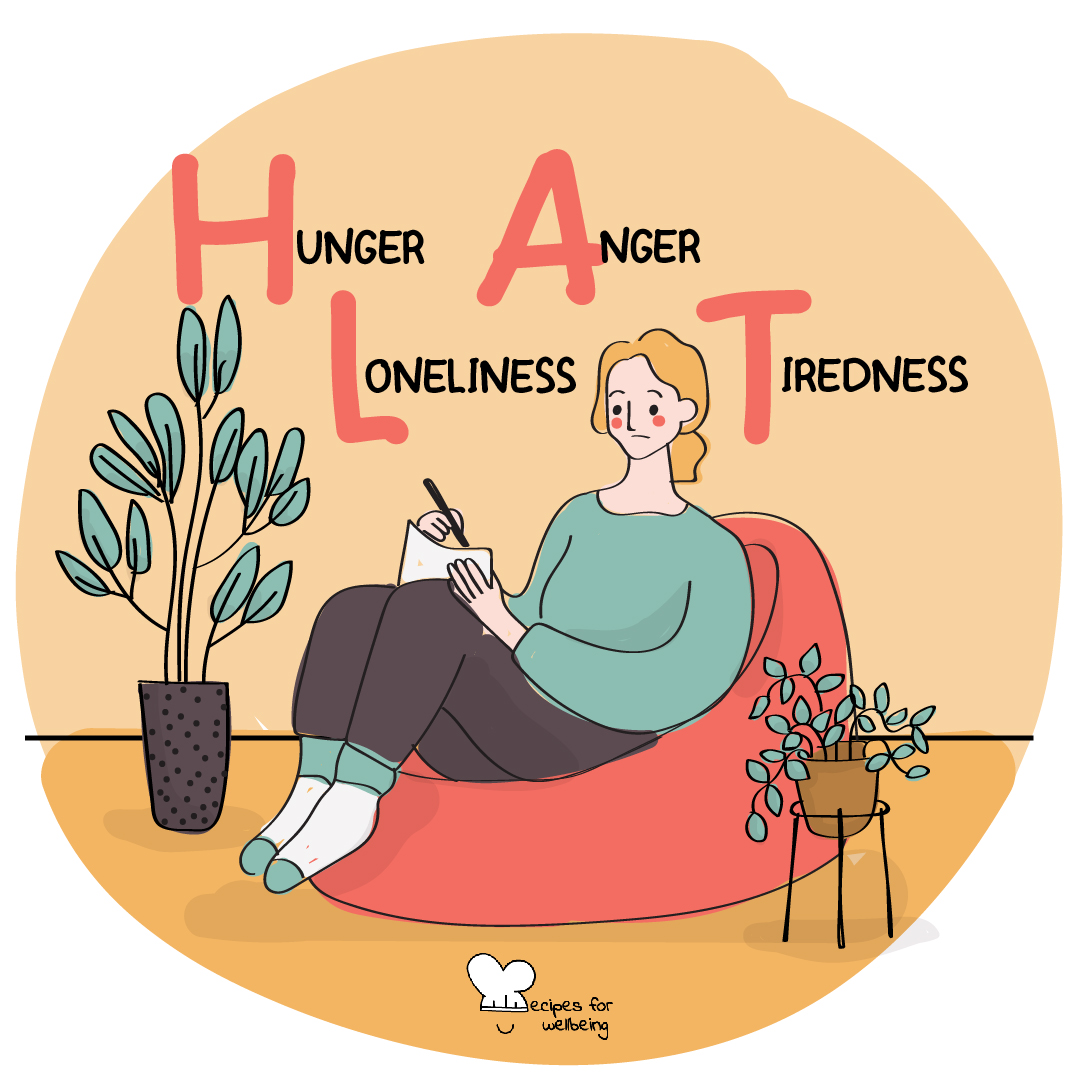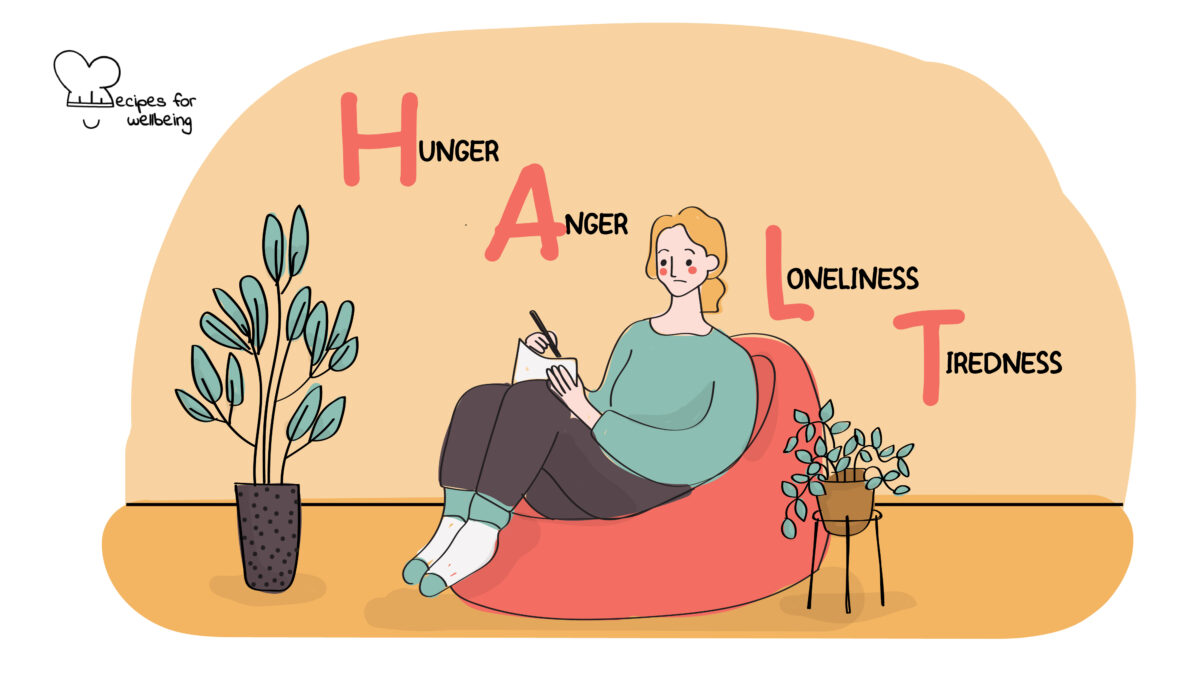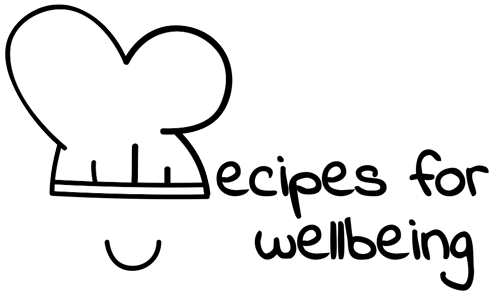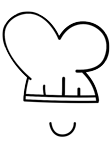
HALT
Sometimes you need to press pause to let everything sink in. ―Sebastian Vettel
👥 Serves: 1 person
🎚 Difficulty: Easy
⏳ Total time: 1-10 minutes
🥣 Ingredients: A sheet of paper and a pen, book “The Onward Workbook: Daily Activities to Cultivate Your Emotional Resilience and Thrive” by Elena Aguilar (if you’re curious to find out more about it!)
🤓 Wholebeing Domains: Awareness, Discomfortability, Positive Emotion, Rest
💪 Wholebeing Skills: Embodiment, Mind-body-connection, Mindfulness, Non-attachment, Reframing, Self-regulation, Sleep, Stress management

HALT
📝 Description
Pre-empt impulsive decision-making with HALT.
When your mind and body are stressed, you are more likely to make impulsive decisions. HALT is a simple acronym that helps you check-in with your emotions before you reach that point of overwhelm and impulsive decision-making. HALT stands for:
- H = Hunger
- A = Anger
- L = Loneliness
- T = Tiredness
When your basic needs are not met, you are more susceptible to self-destructive behaviours so checking in acts as a form of prevention. HALT increases your self-awareness and opens a path for self-care and self-empowerment. This recipe has been adapted from “HALT: The Dangers of Hunger, Anger, Loneliness, and Tiredness” by Bradford Health Services.
👣 Steps
Step 1 – Are you hungry? (1’)
Ask yourself:
- When did you last eat?
- Are you eating regularly or have you been skipping meals?
- Are you eating out of a physical or emotional need?
- Are you consuming the nutrients you need?
Hunger can stem from a physical or emotional need and understanding the difference is important. Often, You eat because you are searching for affection and understanding. You may not find it in the people around you, so you turn to destructive eating habits to ease the emotional hunger. Try out our Mindful eating or Raisin meditation recipes to savour what you are eating (or call a loved one for a chat!).
Step 2 – Are you angry? (1’)
Ask yourself:
- What are you dealing with at the moment that is making you feel stressed?
- What are the main sources of stress in your life right now?
- Is this stress turning into anger?
- What situations, events, attitudes, behaviours… trigger your anger?
Anger gets a bad rap, but it is a healthy emotion to experience! What is not healthy is letting your anger spiral into aggressive and/or destructive behaviours (be they towards yourself, another person, or a situation). Acknowledging the situations, events, attitudes, and behaviours that trigger your anger can be a helpful tactic to pre-empt you from bursting out. Try out our Box breathing or Catharsis through clay recipes to relax your nervous system and alleviate stress.
Step 3 – Are you lonely? (1’)
Ask yourself:
- When was the last time you socialised?
- Was that a positive or negative experience?
- Have you found yourself doing something that goes against your values?
- Do you experience social anxiety (both before, during, and after a social situation)?
In some languages (like Italian), loneliness and solitude are the same word. But these are very distinct. While solitude is the choice to be alone so you can enjoy your own company; loneliness is a sense of isolation that is there even when you are surrounded by others. If you notice you are withdrawing and isolating yourself, try out our Empathic conversation or Dialogues with Nature recipes.
Step 4 – Are you tired? (1’)
Ask yourself:
- Have you been taking breaks?
- Have you been sleeping enough?
- Have you been doing some form of physical activity or exercise?
- Have you been doing anything fun that energises you?
It is easy to dismiss feelings of tiredness when you are busy ticking off the boxes in an endless list of responsibilities, activities, and errands. However, running on low battery more compromises your ability to think critically and creatively, your ability to regulate your feelings and emotions, and your ability to cope with life’s stressors and bounce back from falls.
If you struggle to integrate breaks in your routine, try out our recipe Pomodoro® Technique for Wellbeing. If you are experiencing problems with your sleep, check out our recipes Body scan meditation for sleep, CBT strategies to help you sleep, Narrative reframing for sleep, PowerPoint for a peaceful sleep, and Sleeping well. If you need inspiration for activating your body, we invite you to consider trying one of the following recipes: Chair yoga, Gentle morning flow, Morning yoga routine, and Walking meditation.

